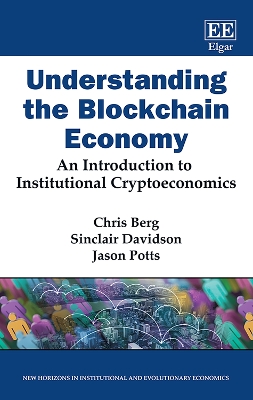New Horizons in Institutional and Evolutionary Economics
3 total works
The creative industries are key drivers of modern economies. While economic analysis has traditionally advanced a market-failure model of arts and culture, this book argues for an...
Read moreThe creative industries are key drivers of modern economies. While economic analysis has traditionally advanced a market-failure model of arts and culture, this book argues for an evolutionary market dynamics or innovation-based approach. Jason Potts explores theoretical and conceptual aspects of an evolutionary economic approach to the study of the creative economy. Topics include creative businesses and labor markets, social networks, innovation processes and systems, institutions, and the role of creative industries in market dynamics and economic growth.
Written by a leading academic expert in the field, this highly regarded compendium will prove essential for researchers and students of creative industries, cultural economics and evolutionary economics.
Contents: 1. Introduction; 2. Cultural Economics vs Economics of Creative Industries; 3. Young, Creative and Extremely Rich; 4. Evolutionary Economics of Creativity; 5. Creativity under Competition and the Problem of Overshooting; 6. Creative Labour Markets and Signalling; 7. Identity Dynamics and Economic Evolution; 8. Social Network Markets; 9. Creative Industries Over an Innovation Trajectory; 10. Fashion and Economic Evolution; 11. Capitalism, Socialism and Culture; 12. Four Models of the Creative Industries; 13. Creative Clusters; 14. Novelty Bundling Markets; 15. Creative Industries and Economic Development; 16. Conclusion; References
The book charts a research programme for evolutionary economics that encompasses the theory of dynamic efficiency and emergence in markets, a computational...
Read moreThe book charts a research programme for evolutionary economics that encompasses the theory of dynamic efficiency and emergence in markets, a computational model of the learning and interacting agent, a competence based theory of the firm and the household, and, via a theory of expectations and plans, an agent-based foundation to macroeconomics.
Principally a work of meta-theory, The New Evolutionary Microeconomics argues for a radical refocus of microeconomic research toward the evolutionary nature of institutions, preferences, technology and knowledge.
This challenging new book should prove timely and important for evolutionary and computational economists as well as those in the fields of managerial economics, business studies and marketing.
Understanding the Blockchain Economy
by Chris Berg, Sinclair Davidson, and Jason Potts
Chapters apply basic economic principles to explore blockchains and distributed ledger technologies through the framework of institutional economics. The book suggests ways in which cryptocurrencies such as Bitcoin may develop further in the future, bringing us back to a barter economy which removes the need for a third person in economic transactions. Outlining a ledger-centric view of the economy, the authors explore how blockchains and dehierarchalisation will reduce the demand for government regulation.
Institutional economists and scholars will greatly appreciate the thorough analysis of the development of institutional cryptoeconomics and insight into the future of blockchains that this book offers. Computer and technology scientists will also find this book to be a valuable read, as well as those working specifically in the blockchain industry.


